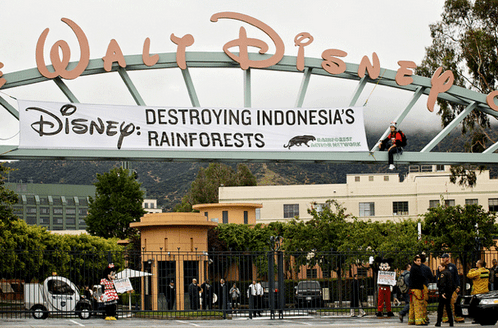Disney becomes latest publisher to turn to sustainable paper products
Activists with Rainforest Action Network, some costumed as Mickey and Minnie Mouse, blocked the entrance to the Walt Disney Company’s headquarters as two other activists unfurled a banner reading, “Disney: Destroying Indonesia’s Rainforests.” (Photo
Two years ago nine of the top ten American publishers of children’s books — including Disney — used paper from endangered rainforests in their books.
Most of the publishers have now committed to only using sustainable paper and Disney too has just announced it will stop buying paper linked to rainforest destruction. Robin Averbeck, a forest campaigner for the Rainforest Action Network, helped Disney to develop its new paper policy.
Disney didn’t realize it was getting paper from Indonesia, which was made even more ironic because some of these books talk about rain forests, including in Indonesia.
“it took a little bit of time for them to understand the issue, to understand how this was ending up in their books,” Averbeck said “Really, Minnie and Mickey arriving on their doorstep to deliver this message in no uncertain terms was a huge wake-up call.”
Last year, a group of protesters, including a pair dressed as the famous mice, went to Disney headquarters in Los Angeles and hung a banner that read: “Disney Destroying Indonesia’s Forests.” Averbeck was on-hand at the protest.
Averbeck says the visual of seeing Minnie Mouse led away in handcuffs was a powerful message — one she thinks Disney couldn’t ignore.
“Disney is the world’s largest children’s book and magazine publisher. So, that’s a lot of paper. And in addition to that, they are the largest owner of theme parks, the biggest licenser of toys,” Averbeck said.
In all of that, Disney has now promised to use recycled products, whenever possible. And when that’s not possible, they have a set of principles to guide them in selecting paper products.
Included in the principles are a desire not to use paper products where human rights are being violated or where natural forests are being converted to tree plantations, Averbeck explained.
“This policy means that everything from the paper that’s in a theme park map in Tokyo to the scripts in ABC studios in L.A., to the packaging that’s used to wrap a princess doll in Russia,” she said “All of those things are going to be on paper that meets Disney’s new policy.”
Averbeck has high hopes that Disney’s new policy will greatly slow deforestation in Indonesia.
“Disney manufactures its products in 25,000 factories around the world,” she said. “That message is going to be sent throughout a very, very wide supply chain.”
She’s also hopeful the new initiative will protect Indonesia’s endangered wildlife. Sumatran Tigers are directly threatened by the Indonesian pulp and paper industry. And, more widely, Disney’s paper policy means that they won’t be sourcing from high-value conservation areas, which is a lot of the critical habitat that’s left for these animals.
“This policy itself is creating a lot of momentum,” Averbeck said. “If Disney can do something like this, a company as large as Disney, there’s no reason that other companies can’t do the same.”
In terms of the publishing industry, just HarperCollins remains among the big 10 who haven’t committed to using sustainable paper products, Averbeck said, adding that her organization would be focused on highlighting that company’s failure to act, in comparison with its peers.
“HarperCollins has largely ignored us. We have been in conversation with them for multiple years at this point, and they have been unwilling to take public action,” she said.
For their part, HarperCollins declined to comment on the Rainforest Action Network’s allegations, but in a statement said they were committed to sustainability.
“HarperCollins paper procurement policies support the general goals of environmentally sustainable fiber use, reducing pollution, and conserving natural resources through recycling and waste reduction. We use only acceptable fiber sources, and have worked with printers to eliminate the use of Indonesian fiber from books produced for HarperCollins,” the statement said.
Every day, reporters and producers at The World are hard at work bringing you human-centered news from across the globe. But we can’t do it without you. We need your support to ensure we can continue this work for another year.
Make a gift today, and you’ll help us unlock a matching gift of $67,000!
